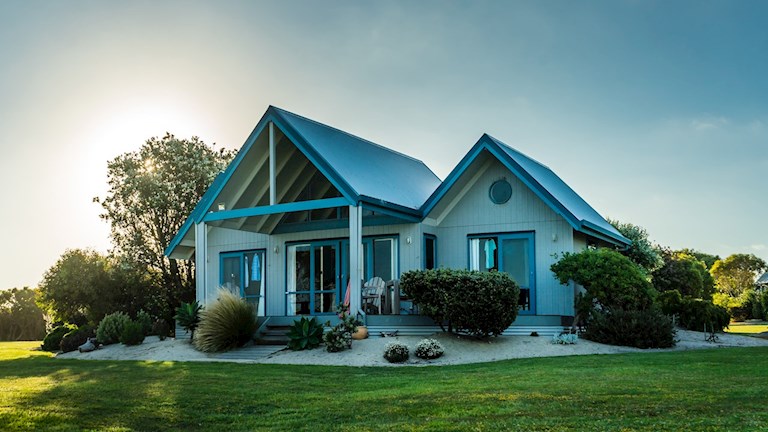By Adam Mease, Business Line Leader, Energy Distribution NEMA, Smart Buildings
Climate Week NYC is about turning ambition into action. And if net zero is the destination, the journey starts at home. Residential buildings may be the quiet giant of climate change, responsible for nearly 20 percent of US emissions1, but they’re also where the fastest, most practical progress can be made. Smarter homes cut carbon. They make us more resilient. And they can unlock equity too.
Nearly half of American homes were built before 19802. How many of those do you think were wired with electric vehicle (EV) chargers, heat pumps, or rooftop solar in mind? Exactly – none. That leaves 48 million homes in need of upgrades3. Put another way: almost one in three households. That’s kitchens, bedrooms, and garages all across America, waiting to be brought into the future. And that’s where ABB’s decades of electrification expertise make the difference, alongside the people and systems that make it work on the ground.
For contractors, it means getting the work done, even when there aren’t enough skilled hands, the rules keep changing, and homeowners are demanding more. For utilities and policymakers, it’s a chance to speed up the shift to clean energy.
Why residential electrification matters
Electrifying everyday systems like heating, cooling, water heating, and appliances is one of the fastest ways to cut emissions. For example, switching to electric heat pumps would lower emissions in 99 percent of US homes4.
At ABB, we see this shift playing out every day on job sites across North America.
But this residential energy shift isn’t just about swapping out appliances, because we all know a new heat pump or EV charger can overload a system that was never built for the loads we experience today.
For the homeowner, that might mean a surprise bill for a service upgrade. For the contractor, it’s one more long job in the middle of a labor shortage. And for utilities? Just more pressure on an already stretched grid.
We need to make the clean energy shift practical. Upgrades that families can actually afford. Jobs that contractors can finish without extra headaches. And systems that communities can count on when it matters most.
Momentum is building fast. Residential electricity use is projected to rise 78 percent by 20505, and at the start of 2023, one in five Americans lived in an area with a building decarbonization policy6. And in Canada, all new buildings are expected to be net-zero ready by 2030.7
Benefits go beyond carbon
From heatwaves to blackouts, resilience is now a household issue. Smarter energy systems keep medical equipment running, maintain cooling during extreme heat, and protect indoor air quality when the grid goes down.
Equity matters too. Reliable, affordable residential power ensures vulnerable communities aren’t left behind in the energy transition.
These benefits are already being felt on the ground. In Asheville, North Carolina, students built a solar-powered tiny home for a family displaced by Hurricane Helene. With ABB’s ReliaHome™ Smart Panel at the core, the home combined solar and storage to deliver resilient, efficient power in an affordable package.
Resilience isn’t only about keeping the lights on. It’s also about powering the biggest shift in how we move.
The home is where transport now plugs in
By 2030, almost half of all new cars sold in the US will be electric8. That means garages, driveways, and parking lots are fast becoming charging hubs. Add in e-bikes, heat pumps, and everything else drawing from the same panel, and the home is now at the center of how we move, as well as how we live.
Making electrification practical
This is where ABB comes in. We’ve spent decades working in electrification, and now we’re bringing that expertise to homes with solutions that work together as one system.
Whether it’s ReliaHome™load centers that meet the latest codes, smart-panel management that ties in solar and storage, or modular designs that make life easier for contractors, the goal is the same: upgrades that are easy to install, built to last, and ready for what’s next.
And for multi-family and mixed-use projects, ReliaMod™ extends that same practicality at scale. Its modular, flexible design allows contractors maximum flexibility, helps installation teams work faster and provides the broadest range of application capabilities.
Powering on, together
Climate Week is a reminder that progress doesn’t happen through pledges alone, it happens when we scale practical solutions that work in real homes, for real people. The technology is ready. The market is ready. And the momentum is here. If we want to ‘power on’ toward a net-zero future, we need to start at home. Because when we electrify our homes, we electrify our future.
For more insights on how ABB can help you with your next residential product, visit electrification.us.abb.com/reliahome.
Sources:
1. https://www.pnas.org/doi/10.1073/pnas.1922205117
2. https://eyeonhousing.org/2025/04/almost-half-of-the-owner-occupied-homes-built-before-1980/
3. https://www.pecanstreet.org/2021/08/panel-size/
4. https://www.rewiringamerica.org/research/circuit-breakers/electrification-myths-heat-pump-efficiency
5. https://www.icf.com/insights/energy/impact-rapid-demand-growth-us
7. https://www.efficiencycanada.org/building-codes/building-codes-for-new-buildings/

